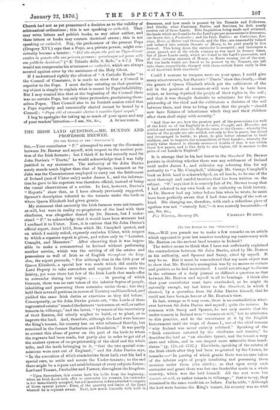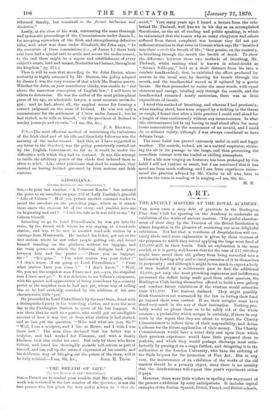[TO THE EDITOR OF THE "SPECTATOR.")
SIR,—Will you permit me to make a few remarks ou an article which appeared in your last number touching my controversy with Mr. Buxton on the ancient land tenures in Ireland ?
The writer seems to think that I have not sufficiently explained the contradiction between Sir John Davies, cited by Mr. Buxton as his authority, and Spenser and Saxey, cited by myself. It may be so. But it must be remembered that my main object was to show that Mr. Buxton's assumption was by no means so certain and positive as he had maintained. I could not attempt to discuss in the columns of a daily journal so difficult a question as that between Mr. Buxton and myself in all its bearings. 1 think also that your contributor must have overlooked, as he might do naturally enough, my last letter to the Standard, in which I showed, by a quotation from Sir John Davies himself, that ho could not have been.in favour of Mr. Buxton's view.
In fact, strange as it may seem, there is no contradiction what- ever between Sir John Davies and myself ; quite the reverse. In common with Saxey and Spenser, be not only asserts that the under-tenants in Ireland were " tenants-at-will," but he attributes to this practice, and to the connivance at it by the English Government until the reign of James 1., one of the chief reasons "why Ireland was never entirely subdued." Speaking of the "Irish exactions extorted by the chieftains and things," he describes-the lord as "an absolute tyrant, and the tenant a very slave and villain, and in one respect more miserable than bond- slaves." (p. 179, ed. 1747.) Elsewhere, speaking of the estates of the Irish chiefs after they had been re-granted by the Crown, lie remarks :—"In passing of which grants there was no care taken of the inferior septa of people inhabiting and possessing these counties under them (the chiefs) ; so that upon every such surrender and grant there was but one freeholder made iu a whole . country, which was the lord himself. All the rest were but tenants-at-will, or rather tenants in villenage ; " that is to say, they remained in the same condition as before. For be adds, " Although the lord were become the King's tenant, his country was no whit
reformed thereby, but remained in the former barbarism and I desolation."
Lastly, at the close of his work, contrasting the more thorough and systematic proceedings of the Commissioners under James I., for accepting surrenders of the Irish and strengthening defective titles, with what was done under Elizabeth, Sir John says, " In the execution of these commissions (i.e., of James I.) there path ever been had a special care to settle and secure the under-tenant, to the end there might be a repose and establishment of every subject's estate, lord and tenant, freeholder and farmer, throughout the kingdom." (p. 273.)
Thus it will be seen that according to Sir John Davies, whose authority is highly esteemed by Mr. Buxton, the policy adopted by James I. was the very reverse of that which Mr. Buxton asserts. Whether Sir John, as your contributor thinks, was unable to "rise above the narrowest conception of English law," I will leave to others to determine. lie was the author of the most philosophical poem of his age, an admirable lawyer, a most accurate archaeolo- gist; and he had, above all, the amplest means for forming a correct judgment on the state of Irelaud. He was not only a commissioner for the settlement of Ulster under James I., but he had visited, as he tells us himself, " all the provinces of Irelaud in sundry journeys and circuits."—I stn, Sir, &c.,
J. S. BREWER.
ES.—The most effectual method of restraining the turbulence of the Irish chief and of his idle and disorderly followers was the security of the under-tenant. And this, as I have suggested in my letter to the Standard, was the policy persistently carried out by the English Government, so far as it could be under the difficulties with which they had to contend. It was this attempt to bridle the arbitrary power of the chiefs that induced them so often to rebel. Like other politicians that shall be nameless, they insisted on having Ireland governed by Irish notions and Irish customs.



































 Previous page
Previous page